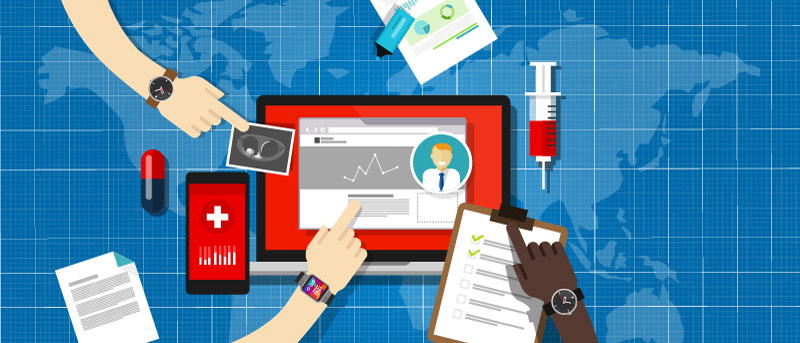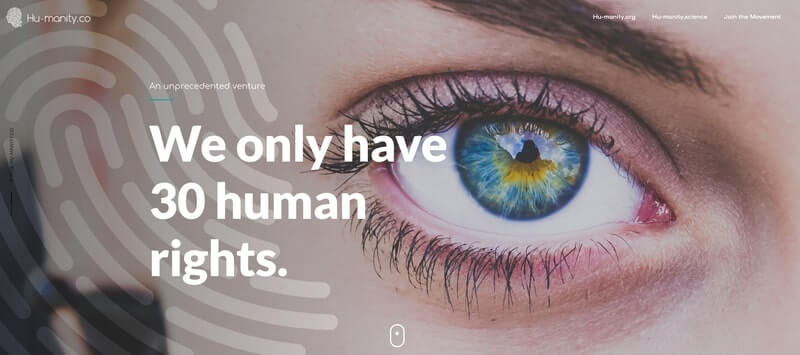



Get new exclusive access to healthcare business reports & breaking news




Hu-manity.co allows users to sell their patient data to big pharma directly by cutting the middleman. The company’s mission is to create a “new decentralized human right” using proprietary technology on top of blockchain and to declare the ability to sell one’s medical data the 31st human right. In a recent press release, the company’s leadership has declared that “everyone has the right to legal ownership of their inherent human data as property.”
Hu-manity is planning on launching its revolutionary blockchain-built iPhone and Android Apps in August 2018 which will allow users to sell their medical data to scientists and pharmacologists.
Launching its solution on top of the blockchain, Hu-manity has developed a smart contract execution protocol allowing patients to negotiate specific terms of consent with companies interested in using their medical data. This would allow any patient to sell their healthcare data to third parties interested in monitoring specific conditions.
Many patients’ worst nightmare is to have their personal medical information exposed.
With Hu-manity that danger might come to an end. Last week, we also covered Embleema, another startup launching a HIPAA compliant healthcare blockchain network which will allow patients to access and share their medical records.
Between these two startups patients will finally be able to take control over their own personal medical data and also make a profit out of selling it.
As harsh as that might sound, selling someone’s medical data is something already being done. The only difference being that middlemen profit on that, instead of the actual patients.
A fellow at Harvard’s Institute for Quantitative Social Science and author of a new book on the topic, “Our bodies, our data”, Adam Tanner, states that typically, patients don’t know that their most personal information, such as the surgeries they have had or diseases they have tested positive for, is actually part of a multibillion-dollar business.
Data miners (usually researchers and scientists) go ahead and cross-reference that information alongside data from pharmacies about prescription beneficiaries, culled by big drugstore chains like RiteAid and CVS.
Many companies trade in medical data – IMS Health is the one named most prominently in the Century Foundation report, but IBM Watson and General Electric and CMI also have businesses in bartering, selling and sharing patient data.
The chain is relatively simple to comprehend when one has a bigger picture of the pharmaceutical industry.
Big corporations want to put new treatments on the market as consistently as possible. New treatments demand a constant flow of human data for trials, so these corporations go to healthcare research companies, like the ones mentioned above, and pay them huge amounts of money to find people who are afflicted by certain medical conditions. Then, these people get screened, and, eventually, are allowed to participate in medical trials.
This, however, doesn’t always bring patients substantial benefits.
First, not all people included in trials receive the real drug being tested but are given placebos instead.
Second, even if they get the drug, nobody guarantees a positive outcome.
Third, even if the drug works, it might not reach the market in time to really make a difference in their treatment.
In effect, many patients serve as guinea pigs, the company developing the drugs gets profit, the middleman is paid for finding and screening patients, but the patients themselves seldom get anything out of this process.
And the money patients are missing out on isn’t trivial either. The human data marketplace represents an estimated $150B to $200B annually.
Our inherent human data is being bought and sold without our consent, authorization, consideration, or compensation.


Healthcare organizations that are currently buying, selling, or using human healthcare data can seamlessly switch to a new industry design that is trustworthy and transparent.
Hu-manity promises that this is possible with minimal investments and disruption, by installing the Hu-manity.co global consent and authorization blockchain.
Patients will be able to benefit from the legal characteristics of the ownership of inherent human healthcare data.
We are talking about real involvement in safe, fair market value negotiations, sharing, security, and protection from theft.
Patients, healthcare organizations, and the monetization of inherent human healthcare data will be able to peacefully and profitably co-exist without regulatory violations.
The blockchain-backed explicit consent is going to allow healthcare companies and organizations to have real-time authorization to use human healthcare data.
Patients are going to be able to benefit from increased security, privacy, and control, while still qualifying to receive compensation via multiple forms of currency.
Hu-manity.co mission is to build a secure and transparent data marketplace. This however, doesn’t come without challenges, but co-founder and CEO Richie Etwaru is confident the company’s initiative is a crucial cultural shift in how we treat data.
Etwaru, author of a book on blockchain & smart contracts called Blockchain Trust Companies, sees the blockchain as a small piece of a much larger solution. Blockchain can provide a rules engine and enforcement mechanism, but he doesn’t see this as the gist of the company.
One of the challenges ahead for Hu-manity is working with big pharma to establish a fair price for the personal data patients will sell to interested parties.
How do you put a price on something that hasn’t been individually sold before? And how do you ensure both the seller and the buyer get a fair treatment in this process? This question is even more complex given the fact that previously, the Supreme Court ruled in favor of IMS Health and against the attorney general of Vermont in a suit on selling and distributing patient data?
Even Etwaru admits there is no set market value for this data, although he believes an individual’s medical data sets could sell for anywhere between $200-$400.
The company is working with economists to determine the best way to gain fair data monetization.
He doesn’t believe patients should negotiate their own terms, but that market cooperatives should determine the value of patient data being brokered between different parties.
It should be noted that his company will take 25 percent of the selling price as a brokerage fee, regardless of how it ultimately works.
Hu-manity.co is the world’s first and only organization developing human rights and corollary sovereign laws in a decentralized manner on blockchains. The company has headquarters in New Jersey, USA and operates in multiple countries. The leadership team includes over two dozen senior executives from Fortune 500 companies, academic scholars, and senior policy advisors from North America, Europe, Australia, and Africa. The vision of Hu-manity.co is a world where the next generation of human rights and policies emerge from a balance of centralized power and decentralized technologically empowered communities. The mission is to create the 31st human right in a decentralized manner as an example for other organizations and visionaries to follow.